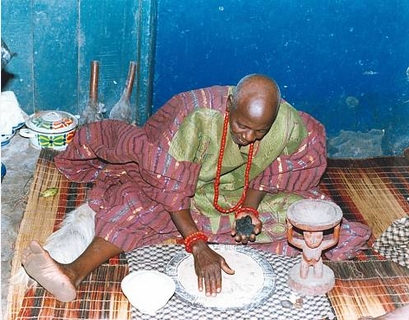
support@yorubalibrary.com
+2348073529208, 07038599574

The Yoruba religion, with its rich spiritual heritage, centers around Ifa, a complex system of divination and worship. Ifa plays a crucial role in guiding the spiritual and daily lives of the Yoruba people. This article delves into the intricacies of Ifa, exploring its origins, practices, and significance within Yoruba religion.
Understanding Ifa: Origins and Beliefs
Historical Background
Ifa is an ancient divinatory system that dates back thousands of years. It is integral to Yoruba cosmology and is believed to have been established by Orunmila, the deity of wisdom, knowledge, and divination. Orunmila is revered as the master of Ifa and is said to have revealed its secrets to humanity.
Core Beliefs
The core beliefs of Ifa revolve around the concepts of destiny (Ayanmo), balance, and harmony. Practitioners of Ifa believe that every individual has a preordained destiny, which can be understood and fulfilled through guidance from the Orishas (deities) and ancestors. The ultimate goal is to achieve balance and harmony in all aspects of life.
The Role of the Babalawo
Who is a Babalawo?
A Babalawo, or father of secrets, is a highly trained priest and diviner in the Ifa tradition. Babalawos undergo rigorous training and initiation to master the complex system of Ifa divination. They are regarded as intermediaries between the physical and spiritual realms, providing guidance, healing, and wisdom.
Responsibilities and Practices
Babalawos perform divination using sacred tools such as the Opele (divining chain) and Ikin. They interpret the patterns formed during divination to provide insights and solutions to various issues, ranging from personal problems to community concerns. Babalawos also conduct rituals, offer sacrifices, and lead ceremonies to appease the Orishas and ancestors.
The Ifa Divination System
The Odu Ifa
The Ifa divination system is based on the Odu Ifa, a set of 256 sacred verses that contain the wisdom and teachings of Orunmila. Each Odu Ifa is a sign or code that represents specific messages and interpretations. The Babalawo uses these codes to provide detailed and accurate readings during divination sessions.
The Divination Process
The divination process typically involves the client presenting their concerns to the Babalawo. The Babalawo then uses the Opele or Ikin to cast the divination signs. The patterns revealed are interpreted through the Odu Ifa, offering guidance, predictions, and prescriptions. This process is believed to connect the client with their destiny and the spiritual guidance of Orunmila.
Orishas in Ifa Religion
Who are the Orishas?
Orishas are deities or spirits in Yoruba religion, each representing different aspects of nature, human life, and the cosmos. They are intermediaries between the supreme deity, Olodumare, and humanity. Each Orisha has specific attributes, powers, and areas of influence.
Major Orishas
• Orunmila: The deity of wisdom and divination, central to the Ifa system.
• Esu: The messenger deity who facilitates communication between humans and the Orishas. Esu is also the keeper of divine order and balance.
• Ogun: The god of iron, war, and labor. Ogun is associated with strength, protection, and justice.
• Yemoja: The mother of all Orishas, associated with water, fertility, and motherhood.
• Sango: The god of thunder, lightning, and justice, known for his fiery temper and power.
Rituals and Ceremonies
Types of Rituals
Ifa rituals and ceremonies are diverse and serve various purposes, including healing, protection, and thanksgiving. Common rituals involve offerings, prayers, drumming, and dancing, which are performed to honor the Orishas and seek their blessings.
Importance of Sacrifices
Sacrifices, known as Ebo, are an essential aspect of Ifa practices. They are offerings made to the Orishas to seek favor, avert misfortune, or fulfill specific requests. These sacrifices can range from simple offerings of food and drink to more elaborate rituals involving animals or other symbolic items.
Modern Relevance of Ifa
Cultural Preservation
Ifa plays a vital role in preserving Yoruba cultural heritage. It provides a link to the past, maintaining traditional practices and values that have been passed down through generations. The teachings of Ifa continue to influence contemporary Yoruba society, guiding moral conduct and social norms.
Global Influence
The influence of Ifa has transcended Yoruba land, spreading to various parts of the world through the African diaspora. Practices related to Ifa can be found in countries like Brazil, Cuba, and the United States, where they have merged with other cultural and religious traditions to form unique syncretic practices.
Conclusion
Ifa is a profound and intricate system that embodies the spiritual essence of Yoruba religion. Through its divination practices, reverence for Orishas, and holistic approach to life, Ifa continues to offer valuable insights and guidance to its practitioners. Understanding Ifa provides a deeper appreciation of Yoruba culture and its enduring spiritual legacy

Learn about the Yoruba concept of Ìwà Pẹ̀lẹ́ (good…

Learn special praises for Divine Being and Creator…